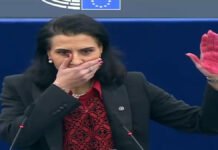Serbia Becomes First European Country to Use Chinese COVID Vaccine for Mass Rollout after Aleksandar Vucic, the Serbian president lashed out at the EU calling the block’s solidarity “a fairytale”.
Hundreds of members of Serbia’s military lined up in their camouflage uniforms at an exhibition hall in Belgrade where nurses injected them with a Chinese-made vaccine against COVID-19.
Last week Serbia received one million doses of Chinese Sinopharm’s COVID-19 vaccine, becoming the first European country to start a mass inoculation program with it.
Belgrade maintains close ties with Beijing and Chinese companies who have invested billions of euros in Serbian infrastructure and energy projects.
In the Western Balkan region, inoculation has started only in Serbia and Albania. Bosnia, Kosovo, Montenegro and North Macedonia have not yet received supplies of any vaccine.
China approved the shot developed by Sinopharm’s BIBP in late December, its first COVID-19 vaccine for general public use. No detailed efficacy data has been released but BIBP has said the vaccine is 79.34% effective based on interim data.
In Serbia, which has a population of about 7 million, 3,771 people have died from COVID-19 and 347,111 have contracted the virus.
EU and the lack of internationalism
President Vucic said in reference to the joint EU vaccine program: “Serbia has donated €2 million for the development of the vaccine. Our contribution to the joint European effort to support the research and end the crisis was not merely symbolic.

We were the first from the region to actually pay money for the COVAX programme, the specialised EU scheme through which we were also supposed to get some vaccines. We have not yet received any. All we got so far was acquired bilaterally.”
With the latest shipment of a million doses of the Chinese vaccine, Serbia became the first, and so far the only country in Europe, with such a quantity of the Chinese jab. More than a quarter of a million of the Russian Sputnik V jab is set to arrive in the coming days, according to official announcements.
With three different jabs already approved by the country’s Medicines Agency (Pfizer/BioNTech, Sinofarm and Sputnik V) and two more awaiting approval (Moderna and Oxford-AstraZeneca), citizens are even allowed to choose which one they want.
Although some of the immunisation began earlier with the Pfizer/BioNTech jab, the mass programme of inoculation only began this week the majority of jabs will have been distributed by the end of June, as was previously announced by Prime Minister Ana Brnabić.
“I know that there is a lot of debate about vaccines. I read in the newspapers that the Russian jab is the best but I did not request a particular one. It does not matter to me. Under different circumstances, I would opt for the one coming from the West – Pfizer or Oxford – but I was just anxious to end the isolation and I could not wait. I guess that this Chinese one is all right too,”
The “nationality” of the vaccine became a subject of debate among Serbs, especially because the Russian and the Chinese ones are not approved in Europe.
The rest of the region is voicing their frustration. Among the most vocal, Edi Rama, the Prime Minister of Albania, whose country managed to obtain just a few hundred jabs bilaterally. He accused the EU of “only thinking about themselves”.
Albanian and Serbian neighbour North Macedonia is still waiting for its share of COVAX jabs, and the first delivery to arrive in the country will be from Serbia. Eight thousand doses is a chunk taken from Serbia’s “Chinese shipment”, forwarded at the purchasing price.
Editor-In-chief of the Nezavisen Vesnik newspaper, Ljuoco Popovski, stated that Belgrade’s decision to share is good for the solidarity between neighbouring countries, both of whom are candidates for EU membership, especially at a time of somewhat failed expectations from Brussels.
“The EU has forgotten about the Western Balkans. We hear a lot of statements about how they are going to help, how they will give €70 million, but that just does not happen. I think it affects the trust in the EU in the whole region. If they go on acting like this, the support for the EU will fade even in North Macedonia where it is traditionally quite high. Because the people now see that they are being treated as second rate citizens,” he asserts.
As Bosnia and Herzegovina struggle with the pandemic and listens to the reports of their media correspondents from Brussels saying that they will have to wait longer for vaccines to arrive, frustration is growing.
“In some other countries people can already choose which vaccine they want, they can select the producer, whether they want Pfizer, Moderna, Chinese, Russian, while here in Bosnia we are waiting for a single box of jabs from the COVAX scheme, Ednan Drljevic, an infectologist from Sarajevo.
“It’s a disgrace,” said Drljevic. “Israel has already vaccinated a million and a half people! It is injustice and we feel frustrated and unsatisfied and we do not know for how much longer we’ll be able to cope with the pressure.”
Montenegro also does not know when it will be able to start immunisation.
‘Not a single EU country’ responded to Italian plea for help with coronavirus’
Last March Maurizio Massari, the Italian permanent representative to the European Union declared ‘Not a single EU country’ responded to Italian plea for help with coronavirus’ The plea for support with the overwhelmed Italian health services feel on deaf ears.
Rome’s requests for face masks and medical gear was met with silence. A top Italian official knocked the European Union for leaving Italy’s plea for medical assistance unanswered while the coronavirus outbreak crippled the country.
Analysts say that the lack of solidarity from Brussels is more a matter of perception than fact. Nemanja Todorovic, editor-In-chief of the European Western Balkans portal specialising in EU integration, said the crisis has exposed clumsy communication between Brussels and the region, rather than real neglect.
The EU has allocated by far the largest aid package for post-COVID recovery of the region but, in practice, may have missed an opportunity to overshadow the role of China and Russia.
But for the Western Balkan region deeds mean far more than words.
Support Independent Journalism Today
Our unwavering dedication is to provide you with unbiased news, diverse perspectives, and insightful opinions. We're on a mission to ensure that those in positions of power are held accountable for their actions, but we can't do it alone. Labour Heartlands is primarily funded by me, Paul Knaggs, and by the generous contributions of readers like you. Your donations keep us going and help us uphold the principles of independent journalism. Join us in our quest for truth, transparency, and accountability – donate today and be a part of our mission!
Like everyone else, we're facing challenges, and we need your help to stay online and continue providing crucial journalism. Every contribution, no matter how small, goes a long way in helping us thrive. By becoming one of our donors, you become a vital part of our mission to uncover the truth and uphold the values of democracy.
While we maintain our independence from political affiliations, we stand united against corruption, injustice, and the erosion of free speech, truth, and democracy. We believe in the power of accurate information in a democracy, and we consider facts non-negotiable.
Your support, no matter the amount, can make a significant impact. Together, we can make a difference and continue our journey toward a more informed and just society.
Thank you for supporting Labour Heartlands












